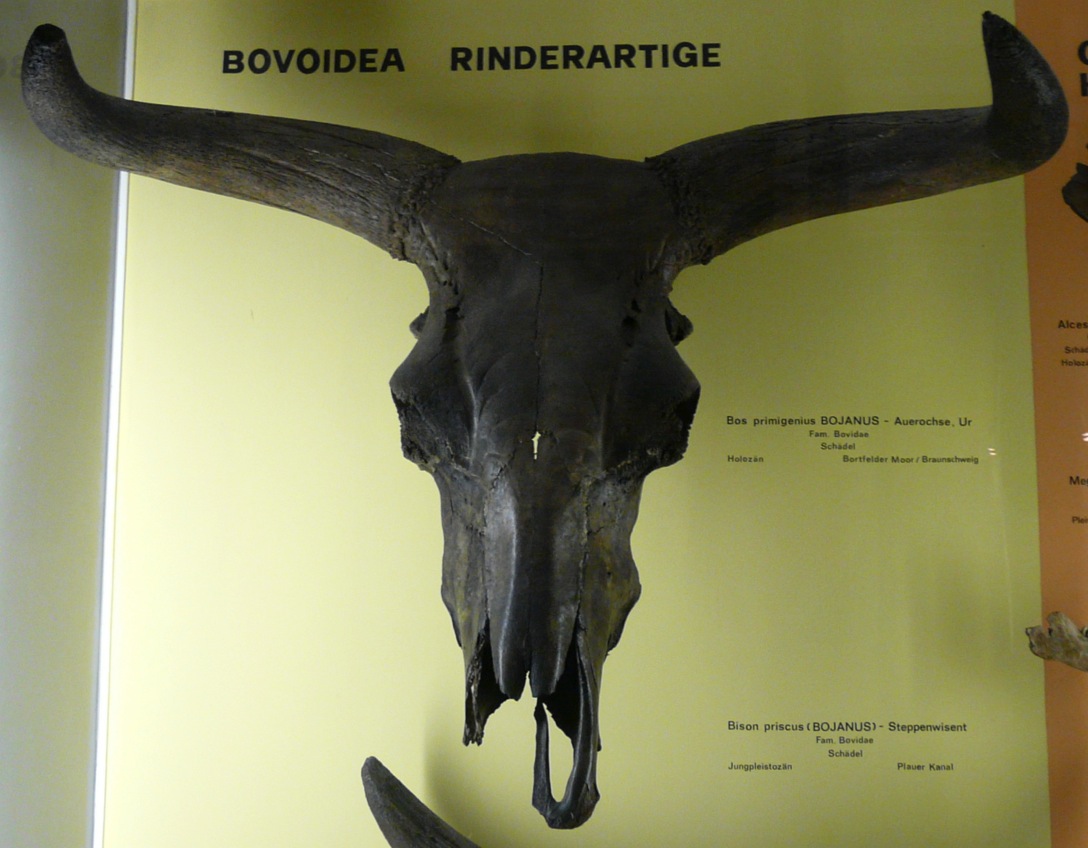How does the skull of this Spanish fighting bull compare to that of an aurochs? What is striking is that the snout seems to be as long as in the aurochs relative to the distance between the eye sockets, what means that this individual had a snout as long as in the aurochs in life. The postorbital portion, however, is definitely shorter as in the aurochs (I know the perspective is not ideal, but I have seen many aurochs skulls from that perspective and the postorbital region is always longer). This could maybe go hand in hand with the reduced brain volume of domestic cattle and paedomorphy. The eye sockets are not as pronounced and massive as in the aurochs, but I am not sure if that difference would be visible in the living animal. Also, not all aurochs bulls had eye sockets as prominent as in the Berlin skull, f.e. the skull of the Vig skeleton has less prominent eye sockets. The horns of the Lidia skull unfortunately have their sheaths still on, but I think it is obvious that the horns of the Lidia bull are smaller than in the aurochs, less curved and point forwards in a sharper angle as in the aurochs.
All in all I would say that a Lidia skull is similar to that of the aurochs, but there are differences, most notably in the postorbital region and the horns.


The link was broken. Chopping the last part of the link worked for me:
ReplyDeletehttps://taxidermia.eu/wp-content/uploads/2014/02/toro-craneo-taxidermia-jose-carlos-manzano-prieto-plasencia-1.jpg
Looks like we need to find cattle breeds that have long foreheads to breeding back programs.
Would the prominent eye sockets suggest a denser coat, something like that of bison; more furlike and less hairlike?
ReplyDeleteI think it has more to do with neoteny. Domestic animals retain more infantile skeletal features than adults. We see the same thing in horses, and even humans (our skulls show a certain resemblance to infant Neanderthals or even Chimpanzees)
DeleteJust found a great Youtube video. It's the first time I've seen such good video material of wild Yaks and close ups from captive wild yaks.
ReplyDeleteIt shows off their morphology (+ variation in horn shape) and some of their behaviour pretty well. Behaviour that might have been true for the Aurochs as well. I could definitely see the Aurochs trying to steal domestic herds and that it could explain some introgression of Aurochs blood into domestic cattle lines.
https://youtu.be/0KYzt4E2Ea0
Here is an interesting article on the morphological effects of domestication.
ReplyDeletehttps://www.derstandard.at/story/2000132849703/sind-wir-schuld-am-kleinen-gehirn-unserer-katzen
The original study is linked at the end of the article.
There are many confirming references to Mr. Foidl's theses - even though this is not about cattle.
Fighting animals tend to have smal eyes. Wild bulls fought each other for dominance over the herds.
ReplyDeleteFight bred pitbulls have smal eyes, but pet bred bully dog breeds often have rather larges eyes.
Small eyes have less risk of being lost in fights.
Lidia is a mixture of different races selected for chargue. Then,they have differents skulls. Here a skull of lidia content://com.android.chrome.FileProvider/images/screenshot/16435498958672017117561.jpg
ReplyDeleteHere differents forms.
content://com.android.chrome.FileProvider/images/screenshot/1643550015588-2109212508.jpg
Skeleton. https://2.bp.blogspot.com/-RvWt5zU7QmM/TwdHwWaOSsI/AAAAAAAAk4I/bX90_KJfkPI/s1600/Esqueleto+del+toro+copia+1.jpg
DeleteForms
http://www.oocities.org/athens/academy/3336/torosde.htm